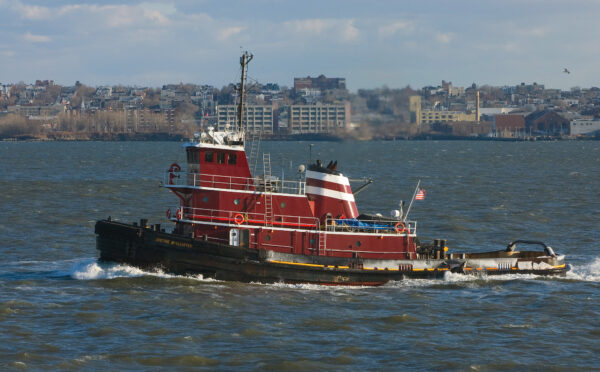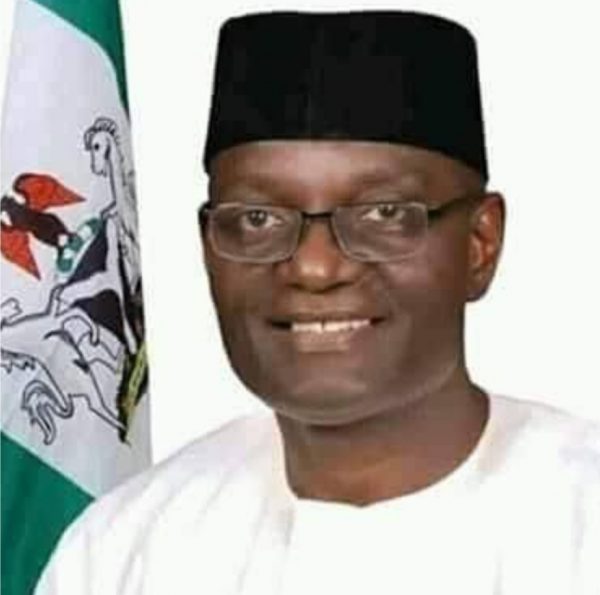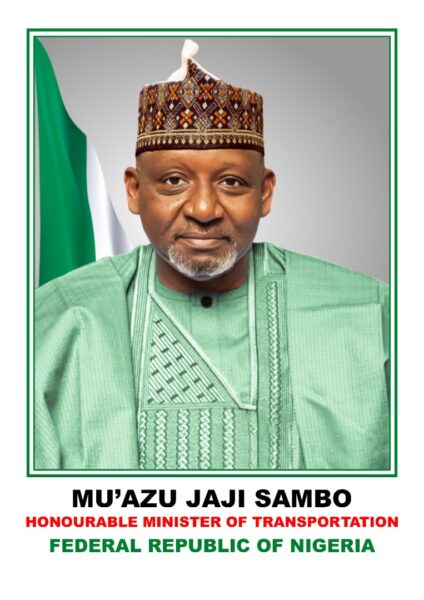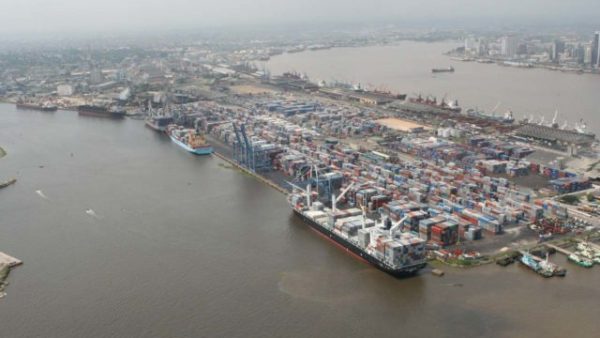FG Mulls Monetary Incentives For Ship Owners
By Kenneth Jukpor

· Concludes zero duty approval for new vessels
· Deep Blue Project wouldn’t require CVFF funding – Jamoh
· Fraud: Why Customs demand hard copy manifests from Shipping Coys
Amid the tough economic times following the advent of the COVID-19 pandemic, the federal government is concluding plans to provide fiscal incentives and monetary palliatives to indigenous ship owners.
The Director General of Nigerian Maritime Administration and Safety Agency (NIMASA), Dr. Bashir Jamoh revealed this on Friday, during a press conference.
According to the NIMASA boss, the fiscal incentives includes reduction in import duty for vessels with zero duty approved for new vessels while minimal single digit duty rates arranged for vessels aged 1 to 5 years.
His words: “Under shipping promotion, NIMASA got some concession to boost indigenous shipping. We applied for monetary and fiscal incentives. The fiscal incentive is under the Federal Ministry of Finance while the monetary incentive has to come through the Central Bank of Nigeria (CBN). We are yet to conclude the process for the monetary incentives”
“For the first time in this industry, we have reached fiscal incentives where there is a drastic reduction of Customs duty to be paid on imported vessels and this has been approved. If you are importing a brand new vessel, you’ll pay zero duty. Vessels aged 1-2years has a minimal customs duty rate of 1% to 2% and we continue to graduate it against the age of the vessel.”
Jamoh noted that the decision to introduce zero duty on new vessels is to encourage indigenous ship owners to procure brand new vessels and ensure that the nation no longer has rickety rust buckets on its territorial waters that cause accidents and are later abandoned and dumped as wrecks.
The NIMASA boss also dismissed speculations of conflicts between the Cabotage Act and the Suppression of Piracy and Other Maritime Offences (SPOMO) Act.
Industry stakeholders had identified a controversy which stemmed from the Section 19 of the SPOMO Act which referred to CVFF as one of the alternatives for funding
The SPOMO Act, Section 19(1) stipulates that: “The agency (NIMASA) shall, under the supervision of the Minister, establish and maintain a Fund to be known as the Piracy and Maritime Offences Fund (in this Act also referred to as ‘the Fund’). (2) The Fund shall be used for the implementation of this Act”
Subsection 3, further outlines monies to be paid into the Fund as “a. such money as may in each year be approved by the Federal Government for the implementation of the Act; b. gifts, financial contributions by beneficiaries of the services of the maritime law enforcement agencies duties under this Act; c. 35% of the proceeds of the sales of any property seized and anything forfeited under this Act including instruments used in the commission of crimes and of criminal activity under this Act; d. contribution from the maritime fund under NIMASA; e. contribution from the CVFF under the Coastal and Inland Shipping (Cabotage) Act”
Noting that contribution from the CVFF under the Coastal and Inland Shipping (Cabotage) Act is also an alternative source of revenue for the Piracy and Maritime Offences Fund, some industry experts described the clause as a violation of the Cabotage Act which provides guidelines to access the CVFF.
Speaking on the issue, Jamoh stressed that the CVFF wouldn’t be required for the functions highlighted under Section 19 of the SPOMO Act. He added the sponsors of the SPOMO Act were acting in good faith by expanding the areas of funding the project.
According to Jamoh, NIMASA’s 2021 budget covered the revenue for the Piracy and Maritime Offences Fund even as he has written to the federal government for a dedicated account for that purpose.
Jamoh also expressed delight that several donor countries are willing to partner the agency on the fund.
In another development, the Nigeria Customs Service (NCS) has accused shipping companies operating in the country of swindling the government by altering the original manifests of consignments from the ports of call.
This is coming in response to complaints by shipping companies who allege that their activities are tedious even as they expend more resources printing hard copy manifest for Customs despite submitting an electronic one.
Speaking with MMS Plus newspaper during an exclusive chat on Friday, the Area Controller of Apapa Customs Command, Comptroller Yusuf Malanta lamented that shipping companies have abused the privilege of submitting electronic copies by manipulating the documents.
“The issue is that they want to manipulate manifests, so instead of transmitting the documents from the source they transmit it from the last port of call. If shipping companies transmit these documents from the source which is the ideal process, there would be no need for the corrections which constitute a large percentage of the documents on my table.”
“Customs shouldn’t be receiving letters of amendment to correct the consignee’s document from the shipping lines. This is a process where the consignee buys something abroad and receives an invoice that is given to a shipper who processes the bill of lading and sends the manifests to Customs. What’s the need for making an amendment if the original manifest from the port of origin is sent to Customs? Shipping companies have to be sincere with themselves,” Malanta said.
The Apapa Customs boss also noted that if a ship has 1000 containers, it wouldn’t necessarily have 1000 pages of manifests because one bill of lading could cover 100 containers and the total hard copy manifest could be less than 100 pages.
“Let’s also note that a manifest is the complete inventory of all cargoes onboard a vessel and Customs need to be aware because of the security risks as well as duty purposes. I don’t see how shipping companies would spend billions for these manifests even though they also send these manifests to Nigerian Ports Authority (NPA). There was a time when shipping companies had to send eight copies of these manifests to several units of Customs such as Enforcement, CIU, Gate, Long Room, CAC, Valuation and others. At that time, they didn’t do the manipulations we see today. Now, they have the liberty to transmit these manifests electronically but they have started withdrawing some bill of lading after transmitting it. They change the structure of the bill of lading and come up with new ones or sometimes we receive double transmission of manifests. This is a major issue we are facing and shipping companies should learn to be very transparent,” he added.
Recall that during an engagement with Nigerian Shippers’ Council (NSC), the Managing Director of Ports and Terminal Multipurpose Limited (PTML) and Grimaldi shipping agency in Nigeria, Mr. Ascanio Russo lamented that operating manual manifests is a major setback for shipping companies in the nation.
His words: “We transmit manifests to all the agencies electronically but NIMASA isn’t ready yet for online platforms. They still demand the manual one, but they have assured that in this month (June), they would begin acceptance of online manifests. NPA is also collecting manual manifests despite having an online platform since three years ago. They insist on the manual manifests as well as the online version. We also submit manual manifest to Nigeria Customs Service (NCS). The challenge is that we are printing more than 1000 papers for each manifest and we submit 11 manifests which translate to 11,000 papers for each vessel. This is a major challenge for us.”
Speaking on the much-publicized need for a National Single Window, Comptroller Malanta observed that the first holistic approach to address the issue was introduced by Customs in 2014 with the Customs trade portal.
According to him, this trade portal is recognized by the World Customs Organization (WCO) and World Trade Organization (WTO) and it availed an open platform accessible to all port stakeholders.
He said: “Since 2014, NCS has had a trade portal which has been displayed to all stakeholders. This trade portal provides information for anything ranging from HS code to other issues. It’s a platform for all stakeholders. So, what exactly is a Single Window? If everyone could access the trade portal, participate and do his or her business via the trade portal, what’s the need for a different single window because we have it?”







